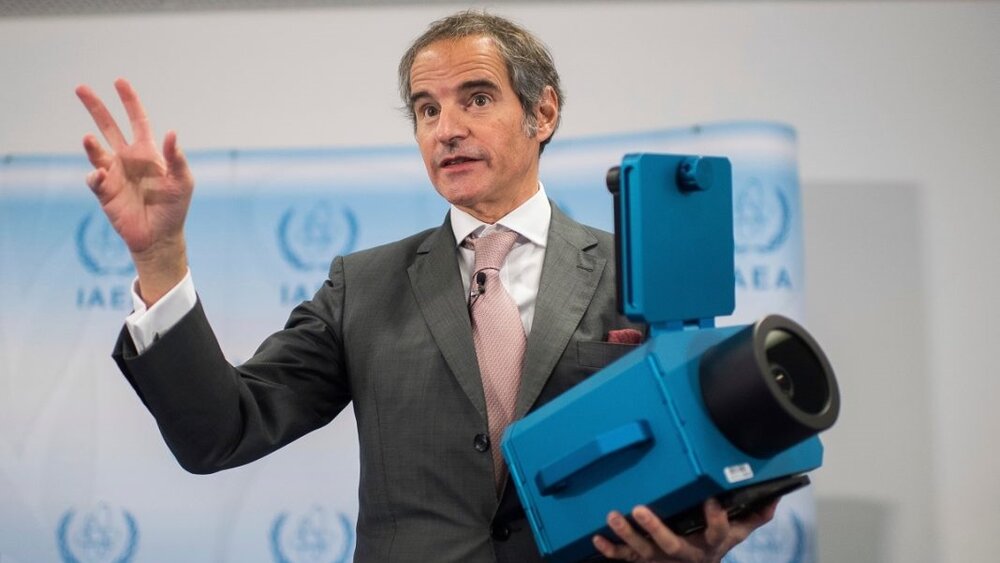Iran responds to Grossi by cutting off cameras beyond Safeguards

TEHRAN — The Atomic Energy Organization of Iran (AEOI) released a statement on Wednesday announcing that it has removed two of the International Atomic Energy Agency’s surveillance cameras which were beyond Safeguards agreement from a nuclear facility.
“Iran has so far had extensive cooperation with the IAEA, but unfortunately the IAEA, without considering that this cooperation is due to Iran's goodwill, not only did not appreciate it but also considered it Iran's duty. For this reason, it was decided to stop the operation of the OLEM (Online Enrichment Monitor) enrichment surface line measurement camera and the IAEA flowmeter from today, which has been ordered by the relevant authorities,” the statement said.
Meanwhile, an AEOI official told Al Jazeera that two CCTV cameras have stopped working in one of Iran's nuclear facilities, starting Wednesday.
The cameras that were stopped are not part of Iran's commitment to the comprehensive Safeguards agreement, he added.
80% of the Agency's cameras continue to work in Iran's nuclear facilities, he said.
Meanwhile, Behrouz Kamalvandi, the AEOI vice chairman and spokesman, said, “In accordance with the Strategic Law on the Lifting of Sanctions approved by the Majlis (Parliament), we decided to turn off all beyond-Safeguards cameras that were recording data in our nuclear sites. Therefore, no information would be recorded from now on.”
Talking to national TV, Kamalvandi said, "Iran cannot be cooperative while the Agency displays unreasonable behavior. We hope the Agency will come to its senses and respond with cooperation with Iran."
Kamalvandi also said other measures are being considered.
He added that the Western countries, especially the United States and the three European countries of France, the UK, and Germany, have started acting against Iran.
“Hence, it was decided to stop some of the beyond-Safeguards cooperation, which was not part of our obligations and was done in good faith. For example, recording some activities by the Agency's cameras which recorded OLEM surface flow measuring device and the IAEA’s flowmeter in Iran.”
Kamalvandi said relevant officials ordered to stop the operation of these cameras, although the information of these cameras was not supposed to be given to the IAEA unless the conditions of Iran in the Vienna talks were met.
The Wednesday decision by Iran is in line with the parliamentary approval which has tasked the AEOI to increase nuclear activities and limit cooperation with the IAEA until illegal sanctions against Iran are lifted.
Iran’s move in curtailing cooperation with the IAEA comes as the United States and the European trio have submitted a draft resolution to the IAEA's Board of Governors criticizing Iran for not fully answering the IAEA questions on traces of uranium found at alleged undeclared sites.
The move by Tehran attracted the attention of foreign policy analysts worldwide. Eldar Mamedov, a foreign policy advisor to the European Parliament, tweeted, “Well, that was quick and entirely predictable. As a reaction to the U.S./E3 censure resolution in the IAEA. Either the JCPOA is restored swiftly, or we are heading towards a crisis.”
The resolution will be debated and voted on at this week's meeting of the Agency’s 35-member board.
Meanwhile, the rounds of Vienna talks are now at stake in their entirety, given the ill-considered action of the United States and the E3.
Iran’s nuclear chief Mohammad Eslami said on Wednesday, “We do not accept these accusations (on alleged sites), nor do we retreat with this heavy psychological operation. We have a remnant of good faith in the JCPOA and if they do not want to fulfill their obligations, we will definitely reconsider that remnant of our good faith.”
Eslami has also said Iran has provided answers to all these questions that finally led to the conclusion of the 2015 nuclear deal, officially known as the Joint Comprehensive Plan of Actions, but IAEA Director General Rafael Grossi has not had the will to acknowledge Iran’s responses as “technically satisfactory.”
It must also be noted that the IAEA Board of Governors and Grossi himself are responsible for the current situation and what may happen in the future.
On Wednesday, Iran’s representative in the IAEA, said, “It is ridiculous that the Israeli regime, which is not a party to any of the disarmament and arms control treaties and is not willing to cede its nuclear facilities and activities to the Agency's safeguards, is so rude as to manipulate the facts and preach to other NPT members.”
Iran has warned that the decision may seriously jeopardize efforts to resume the stalled talks to revive the JCPOA.
If the United States seriously wants to return to the JCPOA, it must stop pressuring the IAEA with the help of its allies and let the UN nuclear watchdog act to its professional duties; It must also stop wasting time and respond to Iran’s demands in writing. The window of opportunity is closing.
